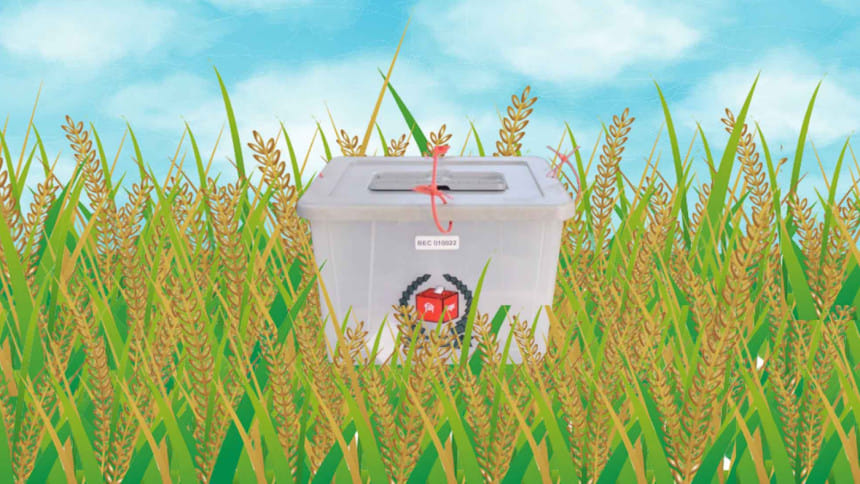Election 2023: Is the BNP still relevant?

With another general election due next year, nobody really knows whether Bangladesh Nationalist Party (BNP), the main political opposition in the country, will participate in it. The BNP seems adamant about not taking part in any election, as has mostly been the case over the last 13 years that the Awami League-led government has been in power. The BNP's claim is simple: There can never be a free and fair election under the current partisan government.
In all fairness, the claim is quite straightforward for one of the two major political parties in a country where non-partisan interim governments holding elections has been a norm in the past. The BNP wants the current government to hand over election-time ruling duties to a "neutral" administration, which the ruling party refuses to do, out of fear of a repeat of 1/11. As a result, the two political parties' opposing stance on a neutral poll-time government has now probably become the longest standing political stalemate in the history of Bangladesh.
No matter how adamant the BNP seems now, the party did contend in the last general election under the current government four years ago, after a lot of drama. For the most part, they kept on pushing the same agenda: no elections under the incumbent partisan government. But, in what is largely dubbed as a last-minute decision, they went to the polls in 2018 and, quite understandably, the outcome was disastrous: the BNP ended up winning just six seats in an election that was marred by allegations of widespread vote-rigging and engineering. This time around, though, the party seems to have learnt from its mistakes and does not seem likely to make any hasty decision again. Interestingly, the last time the BNP went to an election under a caretaker government, almost 14 years ago, the outcomes were almost equally disastrous: they managed to bag just about a quarter of the 300 seats in parliament.
So, after having experienced both boycotting (2014) and contending (2018) in elections under the current partisan government, and coming out with a bitter taste in the mouth on both occasions, one wonders: Can the BNP really afford another election boycott? Can the party survive in the long run if it continues to boycott elections?
There aren't any straightforward answers to these questions. Everything the BNP tried in the last 14 years has mostly backfired. They lodged violent street protests on multiple occasions, which resulted in the loss of lives and properties and only brought harsh lashing at home and abroad, but could not stop the Awami League from holding elections.
One stream of thought within the party – endorsed mostly by veteran leaders who have been there since the birth of the party – is to find a place of compromise and join the polls. Their past experience says the current government is extremely unlikely to amend the constitution to reinstate the caretaker government system. So, the best option for the BNP would be to have peaceful political negotiations to find a middle ground, and a way to come out of the longest "power hiatus" in the history of the party by joining the polls.
The second group is relatively younger and is led by Khaleda Zia's exiled son Tarique Rahman. The adamancy of "not joining the polls unless there is a non-partisan caretaker government" is what they endorse. They believe that the party leaders and activists have already paid a high price by being in the opposition and on the run for a long time. So, they have nothing to lose. Many of them have many more years left in their political careers, and hence are ready to invest more time, unlike the other, veteran group, who are mostly nearing the end of their careers and want to finish on a high note.
However, one big plus for the BNP is that the party has remained more or less united despite all the hardships that they have had to endure since leaving power 17 years ago. In fact, the party is currently going through the roughest patch in its history: Chairperson Khaleda Zia has been in jail for several years; second-in-command Tarique Rahman has been in exile for even longer; there are at least 200,000 political cases against BNP leaders and activists, just to name a few of the predicaments. Everyone thought the party was going to collapse after Khaleda Zia was jailed. But that did not happen – none of the senior leaders left the party.
Another big plus is that, no matter how tough things have been, the BNP is still one of the two most popular political parties in Bangladesh. Even in the remotest corners of the country, devoid of any civic facilities, there is a local committee of the BNP, just like there is one for the Awami League. Despite not being in power for so many years, that has not changed.
Although it seems like a mammoth task in the face of hundreds of thousands of cases hanging over the heads of its leaders and grassroots workers, the BNP needs to somehow find a way to reclaim the strength to channel its grassroots popularity and support into building a national political movement. Because whether they decide to join the polls for a decent result or take to the streets to prevent the government from holding the elections, they will require their grassroots to rise up to the occasion once again.
Mohammad Al-Masum Molla is deputy chief reporter at The Daily Star.

 For all latest news, follow The Daily Star's Google News channel.
For all latest news, follow The Daily Star's Google News channel. 





Comments